Alright, Demeaning Demeanor, A Little Latin Goes a Long Way, A Nice Question, Is OK Alright? and Beyond the Pale.
Very Good, Dear. Now Shut Up and Eat Your Brussels Sprouts.
Dear Mr. Morris: I have a running argument over this with my mother. She claims
there is no such word as "alright," that it is correctly two words, "all right." I always answer
that, if we have perfectly acceptable words such as "also" and "almost" which were formerly
two words, then by rights we ought to have a word "alright." But none of my arguments
have convinced her. Who is right? -- Alexander Heppenheimer, via the Internet.
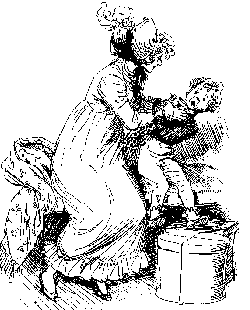 It occurs to me that any question posed as "Who is right: me or my mother?" is one of
those traps they warned us about in columnist school. That way lies madness, so rather than
worrying about which of you is "right" or "wrong," I think I'll confine my remarks to a
general examination of the question, without drawing a conclusion. You two can then argue
about it some more over dinner. Probably for years to come.
It occurs to me that any question posed as "Who is right: me or my mother?" is one of
those traps they warned us about in columnist school. That way lies madness, so rather than
worrying about which of you is "right" or "wrong," I think I'll confine my remarks to a
general examination of the question, without drawing a conclusion. You two can then argue
about it some more over dinner. Probably for years to come.
The answer to whether "alright" is proper usage depends on whom you ask. The
eminent English grammarian H.W. Fowler thought not, in no uncertain terms. Writing in
"Modern English Usage" in 1926, Fowler let it be known that "The words should always be
written separate; there are no such forms as 'all-right,' 'allright,' or 'alright'...."
About sixty years after Fowler stated his opinion, my own parents, William and
Mary Morris, posed the question of "alright" to a panel of usage experts they surveyed for
their "Harper Dictionary of Contemporary Usage." The panel agreed overwhelmingly with
Fowler -- 86 percent said that they wouldn't use "alright" as an adjective ("He's alright"), and
75 percent rejected its use as an adverbial phrase ("Alright, I'll do it").
On the other hand, Bergen and Cornelia Evans, in their "Dictionary of Contemporary
Usage," point out that there's a case to be made for "alright." Using "alright" as a synonym
for "O.K." or "satisfactory," they note, "would allow us to make the distinction between 'the
answers are alright' (satisfactory) and 'the answers were all right' (every one of them)."
So there you have it. Personally, I wouldn't use "alright," but whatever your mom and
you decide on is all right with me.
The Drinker I Drunk, Demeanor I Get.
Dear Evan: Would you happen to know what the relationship is (if any) between the
words "demean" and "demeanor"? Funny what questions arise after only a small amount of
alcohol. -- Mary Maxwell, via the Internet.
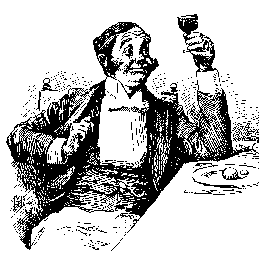 You're telling me. Actually, the most interesting questions ("Where am I?" and "Who
are you?") usually don't arise until the next day, or so I've heard. I myself don't drink (I had
originally typed "I don't dink," which is not very convincing), so all those rumors you've
heard about how I write this column are baseless. Well, the one about the moose is true, but
largely irrelevant to this discussion.
You're telling me. Actually, the most interesting questions ("Where am I?" and "Who
are you?") usually don't arise until the next day, or so I've heard. I myself don't drink (I had
originally typed "I don't dink," which is not very convincing), so all those rumors you've
heard about how I write this column are baseless. Well, the one about the moose is true, but
largely irrelevant to this discussion.
It seems logical to conclude, even when sober, that there would be some connection
between "demean" and "demeanor." Not only does "demeanor" contain the word "demean,"
but both words have to do with the general subject of behavior. My "demeanor" is how I
behave, and if I behave badly, I am said to have "demeaned," or degraded, myself in the
estimation of people around me. "Demean" and "demeanor" seem to go together, as gin and
tonic do, I am told.
It's a bit of jolt to discover, therefore, that the two words have absolutely nothing to
do with each other. "Demean" dates back to the 17th century and was formed from the
adjective "mean" in its archaic sense of "inferior or low in status." To demean someone was
to reduce them to a lower status.
"Demeanor" is a bit older, dating back to the 15th century, and has a more interesting
history. The ultimate source was the Latin word "minare," meaning "to drive a herd of
animals," which became the Old French "mener," meaning "to lead," which was joined by the
"de" (which doesn't mean much in this case) to give us our English word "demeanor."
Not to sound too much like an anarchist, but I think that it's interesting that
"demeanor," the term we use to denote proper conduct in society, embodies a metaphorical
herd of animals being driven along. It's enough to make me want to bolt from the herd and
head for the nearest bar.
Then Again, It's Pretty Much All the Latin I Remember.
Dear Evan: I'm hoping that you can clear up something that has always confused me.
What do "e.g." and "i.e." mean, and what is the difference between them? -- A.K., New York
City.
If you're confused, you have plenty of company. "I.e." and "e.g." are among the most
commonly misused abbreviations in English. Such confusion is unfortunate, because these
abbreviations are not only very useful but also very precise, and precision is sorely lacking in
most writing today.
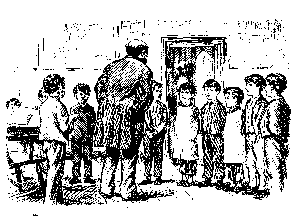 Part of the problem may be that both are abbreviations of Latin phrases, and if there's
one subject not taught in most US schools today, it's Latin. Like W.C. Fields, who joked that
he never got a chance to thank the woman who drove him to drink, I've always wanted to
thank the people who forced me to take four years of Latin in high school. So thanks, gang,
and keep those alumni fund appeals coming.
Part of the problem may be that both are abbreviations of Latin phrases, and if there's
one subject not taught in most US schools today, it's Latin. Like W.C. Fields, who joked that
he never got a chance to thank the woman who drove him to drink, I've always wanted to
thank the people who forced me to take four years of Latin in high school. So thanks, gang,
and keep those alumni fund appeals coming.
"I.e." stands for "id est," which means, simply, "that is" or "which is to say." "I.e."
introduces a definition or a clarification: "Larry was still dressed in his work clothes, i.e., a
clown suit."
"E.g." is an abbreviation of "exempli gratia," which means "for example" or "for
instance." To continue our clown saga: "Larry found that his job had certain disadvantages,
e.g., back problems from cramming himself into tiny cars." Note that both "i.e." and "e.g."
are always set off from the rest of the sentence by commas.
Having said how handy these abbreviations are, I must now add a caution. The point
of writing is to be read, and if you think that there is even a middling chance that your
audience will not understand "i.e." or "e.g.," don't use them.
Bland is Nice
Dear Mr. Morris: A teacher of mine, many years ago, used to warn students against
the use of the word "nice" in their compositions, saying that it didn't mean what we thought it
did. Unfortunately, she never told us what she thought it did mean, and all these years I've
wondered -- what's so bad about "nice"? -- L. P., Toledo, OH.
I can't think of anything particularly wrong with "nice," apart from its near-terminal
blandness. I can only assume that your teacher was thinking of what "nice" used to mean,
which is a story in itself. "Nice," in fact, has had more different meanings than most English
words, and this "nice" word we use to mean "pleasant or agreeable" was once not a very nice
word at all.
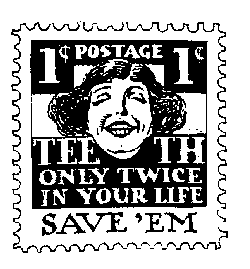 Way back in the beginning, the Romans had a word for it -- "nescius," which in Latin
means "not knowing" or, more bluntly, "ignorant." The French turned "nescius" into "nice,"
and used it to mean "stupid or simpleminded," and it was this sense that was first carried into
English. But by the fourteenth century "nice" had acquired another meaning, that of "wanton
or lascivious," so when Chaucer referred to a young woman as "nice," he meant nearly the
opposite of what we would mean today.
Way back in the beginning, the Romans had a word for it -- "nescius," which in Latin
means "not knowing" or, more bluntly, "ignorant." The French turned "nescius" into "nice,"
and used it to mean "stupid or simpleminded," and it was this sense that was first carried into
English. But by the fourteenth century "nice" had acquired another meaning, that of "wanton
or lascivious," so when Chaucer referred to a young woman as "nice," he meant nearly the
opposite of what we would mean today.
In a remarkable reversal in the fifteenth century, "nice" swung in the other direction
and was used to mean "shy" or "refined," and by the sixteenth century the word had been
narrowed down to mean "fastidious or tasteful." We still use this sense in phrases such as "a
nice touch" or "a nice distinction."
Our modern use of "nice" to mean "pleasant" dates only from the middle of the 18th
century, and was remarkably controversial for many years. It was only in 1934, in fact, that
lexicographers at Merriam-Webster stopped labelling this use as "colloquial" in their
dictionaries. Which, I suppose, was nice of them.
Meanwhile, Back at Alright....
Dear Evan: What is the origin of the abbreviation "OK," meaning "alright"? --
Stephen Davey, via the Internet.
I'm glad that you kept your question short, because the answer is very long. Before I
start my explanation, however, I would like to recommend that everyone interested in the
story of "OK" (as well as the straight dope behind many other words and phrases) obtain a
copy of "Devious Derivations" by Hugh Rawson (Crown Trade Paperbacks, $12). The
always entertaining Mr. Rawson has compiled a masterful and fascinating account of all the
various theories of the origin of "OK," and in the process woven an excellent case study of
how phrases such as "OK" come to be popular.
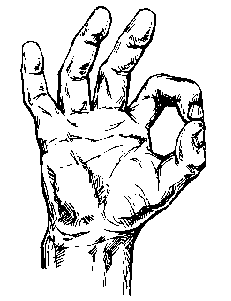 H.L. Mencken once described "O.K." as "the most successful of Americanisms," an
estimation verified by U.S. troops during the Second World War, who reported encountering
the phrase all over the world. Of all the scores of theories (and sub-theories) as to the origin
of "O.K.," the most widely heard traces "O.K." to the "O.K. Club," a political committee
supporting Martin Van Buren's unsuccessful bid for the Presidency in 1840. The "O.K.," it is
said, was short for "Old Kinderhook," Van Buren's nickname.
H.L. Mencken once described "O.K." as "the most successful of Americanisms," an
estimation verified by U.S. troops during the Second World War, who reported encountering
the phrase all over the world. Of all the scores of theories (and sub-theories) as to the origin
of "O.K.," the most widely heard traces "O.K." to the "O.K. Club," a political committee
supporting Martin Van Buren's unsuccessful bid for the Presidency in 1840. The "O.K.," it is
said, was short for "Old Kinderhook," Van Buren's nickname.
It appears that this theory is not so much wrong (the "O.K. Club" certainly existed) as
it is incomplete. Chances are good the Van Buren's partisans would never have named their
club "O.K." had the phrase not already been widely known as an abbreviation of "oll korrect,"
a humorous misspelling of "all correct." American speech in the early 1800s was awash in
similar abbreviations, two of which, "N.G." ("no good") and "P.D.Q." ("Pretty Damn Quick"),
are still heard today.
Ironically, while "O.K." didn't save Van Buren's campaign, the campaign gave "O.K."
a new lease on life -- until then, it had never been as popular as a competing phrase, "O.W."
(for "oll wright"). (By the way, before we start feeling too superior to the cornball 1800s, is
"oll wright" really any worse than the "excuuuse me!" or "not!" fads of a few years ago?).
A Borderline Question
Dear Evan: Finally, an authoritative source to turn to. What is the true etymology of
the phrase "beyond the pale"? A friend of mine swears it has to do with ancient England
and protection of royal rule, armies and the like, but those sorts of things seem to pepper
fanciful etymologies and frankly I've been reading your columns long enough for an inherent
distrust of ANY titillating word origin theory to have set in. -- Amy Logan, via the Internet.
First of all, let me say that I admire your skepticism regarding the story you heard
about the origins of "beyond the pale." It does my heart good to think that I have, even in a
small way, contributed to the atmosphere of doubt and suspicion in the world today. As a
reward, I'm sending you a small, sharply pointed stick with which you can jab people who try
to tell you that "posh" is an acronym standing for "port out, starboard home." I need all the
help I can get.
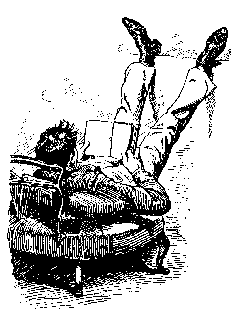 I hope, however, that I will not dent your entirely justifiable wariness when I tell you
that, judging by the details you've given me, the story your friend told you sounds like the
truth. "Beyond the pale," meaning to be outside the bounds of propriety or good taste, does
indeed have to do with ancient England, armies and stuff like that.
I hope, however, that I will not dent your entirely justifiable wariness when I tell you
that, judging by the details you've given me, the story your friend told you sounds like the
truth. "Beyond the pale," meaning to be outside the bounds of propriety or good taste, does
indeed have to do with ancient England, armies and stuff like that.
The "pale" in question is a wooden stake of the sort used to mark boundaries, or a
fence made from such stakes. The word itself comes from the Latin word for stake, "palum,"
and the Latin root lives on in English words such as "impale."
The phrase "beyond the pale" dates back to the 14th century, when the part of
Ireland that was under English rule was delineated by a boundary made of such stakes or
fences, and known as the English Pale. To travel outside of that boundary, beyond the pale,
was to leave behind all the rules and institutions of English society, which the English
modestly considered synonymous with civilization itself.
Back to main page
 It occurs to me that any question posed as "Who is right: me or my mother?" is one of
those traps they warned us about in columnist school. That way lies madness, so rather than
worrying about which of you is "right" or "wrong," I think I'll confine my remarks to a
general examination of the question, without drawing a conclusion. You two can then argue
about it some more over dinner. Probably for years to come.
It occurs to me that any question posed as "Who is right: me or my mother?" is one of
those traps they warned us about in columnist school. That way lies madness, so rather than
worrying about which of you is "right" or "wrong," I think I'll confine my remarks to a
general examination of the question, without drawing a conclusion. You two can then argue
about it some more over dinner. Probably for years to come. You're telling me. Actually, the most interesting questions ("Where am I?" and "Who
are you?") usually don't arise until the next day, or so I've heard. I myself don't drink (I had
originally typed "I don't dink," which is not very convincing), so all those rumors you've
heard about how I write this column are baseless. Well, the one about the moose is true, but
largely irrelevant to this discussion.
You're telling me. Actually, the most interesting questions ("Where am I?" and "Who
are you?") usually don't arise until the next day, or so I've heard. I myself don't drink (I had
originally typed "I don't dink," which is not very convincing), so all those rumors you've
heard about how I write this column are baseless. Well, the one about the moose is true, but
largely irrelevant to this discussion. Part of the problem may be that both are abbreviations of Latin phrases, and if there's
one subject not taught in most US schools today, it's Latin. Like W.C. Fields, who joked that
he never got a chance to thank the woman who drove him to drink, I've always wanted to
thank the people who forced me to take four years of Latin in high school. So thanks, gang,
and keep those alumni fund appeals coming.
Part of the problem may be that both are abbreviations of Latin phrases, and if there's
one subject not taught in most US schools today, it's Latin. Like W.C. Fields, who joked that
he never got a chance to thank the woman who drove him to drink, I've always wanted to
thank the people who forced me to take four years of Latin in high school. So thanks, gang,
and keep those alumni fund appeals coming.  Way back in the beginning, the Romans had a word for it -- "nescius," which in Latin
means "not knowing" or, more bluntly, "ignorant." The French turned "nescius" into "nice,"
and used it to mean "stupid or simpleminded," and it was this sense that was first carried into
English. But by the fourteenth century "nice" had acquired another meaning, that of "wanton
or lascivious," so when Chaucer referred to a young woman as "nice," he meant nearly the
opposite of what we would mean today.
Way back in the beginning, the Romans had a word for it -- "nescius," which in Latin
means "not knowing" or, more bluntly, "ignorant." The French turned "nescius" into "nice,"
and used it to mean "stupid or simpleminded," and it was this sense that was first carried into
English. But by the fourteenth century "nice" had acquired another meaning, that of "wanton
or lascivious," so when Chaucer referred to a young woman as "nice," he meant nearly the
opposite of what we would mean today. H.L. Mencken once described "O.K." as "the most successful of Americanisms," an
estimation verified by U.S. troops during the Second World War, who reported encountering
the phrase all over the world. Of all the scores of theories (and sub-theories) as to the origin
of "O.K.," the most widely heard traces "O.K." to the "O.K. Club," a political committee
supporting Martin Van Buren's unsuccessful bid for the Presidency in 1840. The "O.K.," it is
said, was short for "Old Kinderhook," Van Buren's nickname.
H.L. Mencken once described "O.K." as "the most successful of Americanisms," an
estimation verified by U.S. troops during the Second World War, who reported encountering
the phrase all over the world. Of all the scores of theories (and sub-theories) as to the origin
of "O.K.," the most widely heard traces "O.K." to the "O.K. Club," a political committee
supporting Martin Van Buren's unsuccessful bid for the Presidency in 1840. The "O.K.," it is
said, was short for "Old Kinderhook," Van Buren's nickname. I hope, however, that I will not dent your entirely justifiable wariness when I tell you
that, judging by the details you've given me, the story your friend told you sounds like the
truth. "Beyond the pale," meaning to be outside the bounds of propriety or good taste, does
indeed have to do with ancient England, armies and stuff like that.
I hope, however, that I will not dent your entirely justifiable wariness when I tell you
that, judging by the details you've given me, the story your friend told you sounds like the
truth. "Beyond the pale," meaning to be outside the bounds of propriety or good taste, does
indeed have to do with ancient England, armies and stuff like that.